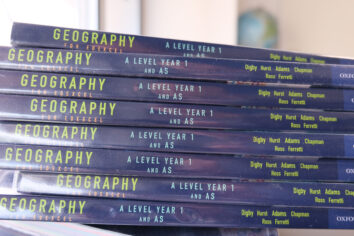New students starting in September: You can find more information about Induction days and submitting your GCSE results in our Start of Year Guide.
why choose this course?
Michael Palin (former President of the Royal Geographical Society) has said that: “Geography explains the past, illuminates the present and prepares us for the future. What could be more important than that?” Inspired by Geography as one of the key disciplines relevant to understanding the world’s changing places and peoples, you will also develop a sense of achievement as you grow as a critical, independent thinker and as an informed and engaged citizen. You will study world issues such as tectonic hazards, climate change, resource security, globalisation, and superpowers. A Level Geography is highly valued by many employers as it enables you to develop many highly sought-after transferrable skills, such as logical reasoning, data analysis and problem solving.
Apply for this course
Start date: 08/09/2025
TOP COURSE HIGHLIGHTS
Diverse and inspiring topics
Local and international fieldwork
Engaging lessons
Excellent facilities

Above and beyond
We provide extensive further study resources relating to Geography both within and beyond the specification. The Geography lecturers are extremely passionate about their subject and are committed to helping you succeed.

Student Review
“My lessons are always really interesting and engaging. The topics are a good mix of expanding on previous knowledge and learning about completely new aspects . There is a huge amount of well organised resources available to students and the lecturers are always happy to help. Thank you for a brilliant two years.” (Hattie R, former A level Geography student)

Enrichment opportunities
We also offer our students geographical field study visits to Iceland, Toronto and eSwatini. Our students also have access to a wide range of enrichment activities, including local and international fieldwork, a range of guest speakers, trips, visits and essay competitions.
WHAT WILL I LEARN?
The full A Level Geography course is outlined below.
Paper 1 (externally-assessed written examination; 30% of the A Level)
- Tectonic Processes and Hazards (Year 1)
Understanding of the causes of tectonic hazards is key to both increasing the degree to which they can be managed, and putting in place successful responses that can mitigate social and economic impacts and allow humans to adapt to hazard occurrence. - Coastal Landscapes and Change (Year 1)
Coastal landscapes are increasingly under threat from both physical processes and human activities, and there is a need for holistic and sustainable management of these areas.
- The Water Cycle and Water Insecurity (Year 2)
Water plays a key role in supporting life on Earth. Changes to the most important stores of water are a result of both physical and human processes. Water insecurity is becoming a global issue with serious consequences and there is a range of different approaches to managing water supply. - The Carbon Cycle and Energy Security (Year 2)
A balanced carbon cycle is important in maintaining planetary health. Changes to the most important stores of carbon and carbon fluxes are a result of physical and human processes. Reliance on fossil fuels has caused significant changes to carbon stores and contributed to climate change resulting from anthropogenic carbon emissions.
Paper 2 (externally-assessed written examination; 30% of the A Level)
- Globalisation (Year 1)
Globalisation and global interdependence continue to accelerate, resulting in changing opportunities, inequalities and cultural impacts. Recognising tensions in communities and pressures on environments will help players implement sustainable solutions. - Diverse Places (Year 1)
Local places vary both demographically and culturally with change driven by local, national and global processes. Variations in past and present connections with places lead to very different lived experiences of places at a local level. - Superpowers (Year 2)
Superpowers and emerging superpowers have a very significant impact on the global economy, global politics and the environment. The spheres of influence between these powers are frequently contested, resulting in geopolitical implications. - Health, Human Rights and Intervention (Year 2)
Traditional definitions of development are based largely on economic measures but have been increasingly challenged, with both human health and human rights being seen as significant measures of the progress of a society. The impact of geopolitical interventions on both human health and human rights is variable and contested, which can lead to inequalities and injustice.
Paper 3 (externally-assessed written examination; 20% of the A Level)
Paper 3 will provide you with a resource booklet containing information about a geographical issue within an unfamiliar place-based context. This issue will be rooted in topics studied for Papers 1 and 2. To prepare for Paper 3, you will develop your ability to draw synoptically on knowledge, understanding and skills from across the course.
Non-examined Assessment (internally-assessed written coursework; 20% of the A Level)
This non-examined assessment requires you to define a geographical question for independent investigation. Your investigation may be either physical or human (or both) and will be clearly linked to an area of the taught course. It will incorporate both primary fieldwork data and secondary data. Your written report will evidence independent analysis of this data.
WHERE WILL IT TAKE ME?
A Level Geography is a facilitating subject that is highly regarded by universities and supports students seeking degrees in many areas including both the sciences and humanities. Many students progress on to Geography degrees, but A Level Geography is also very well suited to degrees in International Relations, Politics, Economics, Environmental Studies and many more.
Careers after university could include working for international aid agencies, local councils, or environmental organisations. A level Geography can also lead to high level apprenticeships and further training in various sectors.
ASSESSMENT ARRANGEMENTS
You will be examined via three externally assessed written examinations at the end of your second year of study (worth 80% in total). The remaining 20% of your A level is from the Non Examined Assessment, which is a internally assessed piece of written coursework (worth 20%).
ENTRY REQUIREMENTS
GCSE Grade 6 in Geography or English, alongside four GCSEs at a minimum of Grade 4.
INFORMATION & SUPPORT
We provide extensive “further study” resources relating to Geography both within and beyond the specification. We also offer our students geographical field study visits to Iceland, Toronto and eSwatini.
“My Geography lessons are always really interesting and engaging. The topics are a good mix of expanding on previous knowledge and learning about completely new aspects of the subject. There is a huge amount of well organised resources available to students to aid learning and the lecturers are always happy to help. Thank you for a brilliant two years.” (Hattie R, former A level Geography student)
Meet the staff, tour the campus and find out about life as a student at one of the best colleges in the country.







